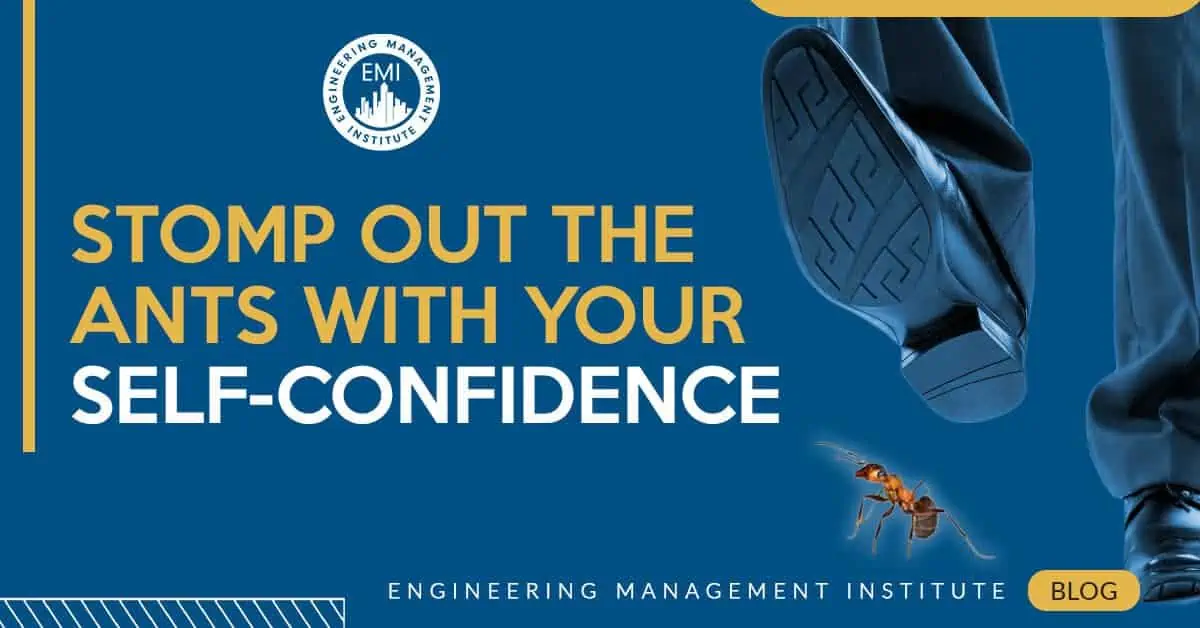This is a guest blog by Pamela A. Scott

“Don’t believe everything you hear — even in your own head.” That advice comes from Dr. Daniel Amen, who coined the term ANTs—Automatic Negative Thoughts. Just like real ants that ruin your picnic, ANTs can ruin your day.
Your goal is to stomp out those ANTs. Kill those negative thoughts. Don’t listen to them when they pop into your brain. Remember, you are in charge, not the ANTs. Dr. Amen has some suggestions on how to do that here.
People See What You Project
Self-confidence comes from how you project yourself to the world. Do you stand up straight, look people in the eye, reach out to shake someone’s hand when we’re allowed to do that again? Or do you hang back, only speak up when others have expressed their opinions, and look at your shoes?
A few years ago, I was coerced into attending a high school reunion. I hadn’t been back to that town since my family moved the day after graduation. I knew I wouldn’t recognize many people, so I was hanging back, not really mingling.
Maryann came up to say hello. She was as beautiful as ever. She had been the homecoming queen, head majorette, beauty pageant winner — and she was smart. I remembered her as being congenial and friendly, always on top of her game.
She told me she always looked up to me because I had such self-confidence, something she had always lacked. She said she always wanted to be more like me. I was stunned. She saw me differently than I saw myself and vice versa.
Trust Yourself and Go For It!
I recently got to interview Anthony Fasano, founder of the Engineering Management Institute. He has a great story on the website about how he developed as an engineer. It undoubtedly required self-confidence.
“I had a goal of becoming a high-level executive in my engineering organization. When observing the leaders in my company, it was obvious that they possessed skills in addition to their technical skills, namely great people management, or ‘soft,’ skills,” Fasano said.
“So, I set out to develop my ‘soft skills,’ a move that not only rapidly advanced my career, but led to me becoming an internal coach and trainer for my company, and ultimately inspired me to leave my engineering career behind to spend more time helping engineers become more effective managers and leaders.”
That’s what self-confidence can do for you. Trust yourself and go for your dreams.
Build Your Self-Confidence With These Tips:
- Expect to fail and learn from it.
- Lessons learned from coming up short on a project are one of the best gifts you’ll get. You take those lessons and see what happened on the project. What do you need to do differently next time? And what did you do that helped you succeed?
- Keep your lessons learned in a journal and refer back to it often. That knowledge will help you grow your skills and your self-confidence, and make the next project go more smoothly.
- Fake it ’til you make it. This is similar to “Act as if” you’ve already achieved your goal. If you want to be like your boss, mirror his/her behavior, clothing style, body language, speaking style, and more.
From Inc. magazine:
19 Simple Ways to Boost Your Self-Esteem Quickly
From Psychology Today:
Why Self-Confidence Is More Important Than You Think
From EMI:
Building Self Confidence – You Are in Charge of You!
How to Build Confidence as an Engineering Leader (Even in the Face of Not-enough-ness)
How to Build Confidence as an Engineering Leader
4 Behavior Changes That Create Confidence Through Consistent Implementation
Confidence = Decisiveness + Commitment + Resourcefulness
About the Author Pamela A. Scott

Pam started her company more than 20 years ago. For much of that time, Pam has coached engineers and architects to be leaders in their companies.
She brings more than 25 years of communications expertise and leadership experience as:
- A national award-winning newspaper editor
- A communications specialist writing for Congress
- A successful entrepreneur specializing in coaching clients to reach their full potential
Clients have ranged from solo practitioners to companies such as Turner Broadcasting System, Coca Cola, Federal Reserve Bank, and engineering firms such as Walter P. Moore. For 15 years, Pam was a member of Vistage, an international organization of CEOs.
Pam has a master’s in education and human development from George Washington University and a bachelor’s in communication from Bethany College. In Toastmasters, she has achieved Advanced Communicator Bronze and Advanced Leadership Bronze levels.
We would love to hear any questions you might have or stories you might share on stomping out the ANTs with your self-confidence.
Please leave your comments, feedback or questions in the section below.
To your success,
Anthony Fasano, PE, LEED AP
Engineering Management Institute
Author of Engineer Your Own Success




